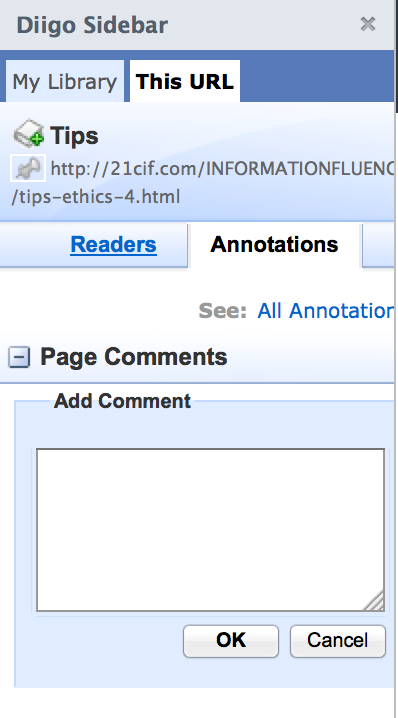Searching | Evaluation | Ethical Use
Ethical Use and the Web

Tip #4: Create an annotated URL list
While bookmarks are a convenient way to store and organize a list
of URLs, standard bookmarks don't allow you to add comments about those
URLs.
Traditionally, students are taught how to use the library. Libraries
are increasingly being organized around the computer. More
and more information can be found on the Internet. To be successful,
students will need to know how to use these new resources as wisely
as, or perhaps more wisely than, they use print resources.
Once you know how to create an annotated list, there will be no end to
the adaptations you can make creating annotated lists for school projects, refreshing old topic lists, and/or teaching others to
do the same. When teachers begin to make their own annotated lists for
the curricula they teach, you will begin to see a growing mutual
learning environment.
There are several ways to make an annotated list of web addresses. A manual process works on almost all computers and requires using word processing software like MS Word. Create a new document, then copy and paste in the URLs you wan to annotate. In most word processors, the links you paste will become active hyperlinks (underlined in blue). This allows you to revisit the pages by simply clicking on the links.
Simply write some notes after each link and soon you'll have a page of annotations. Organize your links by topic. It's easy to cut and paste them to form new groupings.
A more automated approach is to use a social bookmarking tool with built in annotation. With a Diigo Account, for example, you can bookmark a Web page with one click and, if you choose to, select the Annotations tab and type notes in the comments box provided. Be sure to open the sidebar (see the arrow). Other sites make annotation easy as well; if you need help with a specific site, look at that site's FAQs.
Examples of annotated resource lists:
Annotated Resources: Copyright and Fair Use
Annotated Resources: Sample MLA Annotation
Annotated Resources: Sample Diigo Annotation